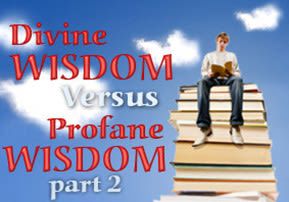
Divine Wisdom Versus Profane Wisdom, Part 2
What a pity for every minute they took away the pursuit of true wisdom, from Torah study and prayer – for these are activities that lead to an...

Negative Wisdom
The perfection to which we aspire is a true knowledge of God. But the only way to attain this knowledge is by receiving the wisdom of God, which is the Torah. Hence Rebbe Nachman strongly warned his followers against studying the profane, man-made wisdom that our Sages refer to as “external wisdom” – studies such as secular science and philosophy. (Nedarim 62a) Such studies do not bring a person to perfection; even worse, they can interfere with his ability to acquire the wisdom of God.
Rebbe Nachman applies the name, “Pharaoh’s daughter” (bas Pharaoh) to such studies. This is based on the story of how Shlomo Hamelech (King Solomon) erred when he married a large number of “foreign” wives (I Melachim: 11:1-13). These were the daughters of non-Jewish kings; although they all converted to Judaism, they exerted a negative influence on Shlomo Hemelech that eventually had disastrous consequences for his kingdom, and for all of Jewish history. Pharaoh’s daughter was the first and foremost of these “foreign” wives. Our Sages tell us that when Shlomo married her, the angel Gavriel came down and stuck a reed into the ocean. This led to the formation of a sandbank which grew into a new body of land, and that was the land on which the city of Rome was eventually built (Sanhedrin 21b). Thus Shlomo’s marriage to Pharaoh’s daughter was one of the causes of the present exile. Since the act of knowing is a kind of “marriage” or union between the knower and the knowledge, Rebbe Nachman views Shlomo’s marriage to Pharaoh’s daughter as an archetype for the involvement of the Jewish intellect with profane, non-Jewish knowledge.
Every person must guard his intellect from the profane, man-made wisdom that our Sages refer to as “external wisdom.” Such knowledge is also alluded to in the name, “Pharaoh’s daughter” (Midrash Tanchuma, parashat Shoftim 4). For the main wisdom that brings a person to a state of wholeness and perfection is the wisdom of Godliness. All other types of wisdom are really negations of wisdom. They are not wisdom at all.
(We can understand why) the word “daughter” (in the name “Pharaoh’s daughter”) alludes to these false wisdoms. When God spoke to the prophet about the return of the exiles, He said: “…bring My sons from afar, and My daughters from the ends of the earth” (Yeshayahu 43:6). According to our Sages (Menachot 110a), (“My sons” refers to the exiles in Babylonia, who were like sons, since their minds were settled and composed, while) “My daughters” refers to the exiles in other countries, who were like daughters, since their minds were not settled and composed. The word “Pharaoh” suggests interference and distraction, as in the verse: “why are you distracting (taphiru) the people from their tasks?” (Shemot 5:4). (Likutey Moharan I:35, 1).
Rebbe Nachman says that the name “Pharaoh’s daughter” hints at the deficiencies and dangers of profane knowledge. Rebbe Nachman calls these forms of knowledge “Pharaoh’s daughter,” for the Talmud says that young girls usually have less settled minds than boys (Menachot 110a, on the verse, “Bring My sons from afar, and My daughters from a distant land” (Yeshayahu 43:6). “Afar” refers to the Babylonian exile, where the Jews were more settled in mind. “Distant land” refers to the other exiles, where the Jew were more troubled and confused), whereas the word “Pharaoh” is related to the root para’ah, which means to “interfere”, “to disturb,” or “to reject.” This suggests that secular wisdom, in its very essence, involves a king of disruption in the process of acquiring true wisdom, the Divine wisdom. In other words, there is something intrinsically negative about secular knowledge. Its underlying attitude towards the Divine wisdom is negative, and thus it has a negative influence on our efforts to reach perfection, since true perfection is the acquisition of God’s wisdom.
Some people waste years of their lives chasing after secular wisdom, and in the end, they have nothing of spiritual value to show for their efforts. What a pity for every minute they took away the pursuit of true wisdom, from Torah study and prayer – for these are activities that lead to an immense, eternal reward.
External Wisdom and Negative Character Trait
In the same section of Likutey Moharan, Rebbe Nachman goes on to explain that external wisdom is not only harmful to the intellect, but also promotes the development of negative character traits. He begins with the idea that the Hebrew word kaneh (“reed” or “stick”) alludes to wisdom. Divine wisdom can be called a “reed,” as suggested by the verse: “Kenei chochmah” (Mishlei 4:7). Although the simple meaning of the verse is, “Acquire (kenei) for yourself wisdom,” it can also be read: “Wisdom is a reed (kaneh).” And just as there is a “reed” that we ought to acquire (the wisdom of holiness), there is also a “reed” that we ought to reject, as suggested by the verse, “Ge’ar chayat kaneh – “Rebuke the wild beast of the reeds…” (Tehillim 68:31). The “reed” we must reject is the wisdom of unholiness, which our Sages refer to as external wisdom. (One reason these studies are referred to as “external wisdom” is that they only provide an accurate description of the external aspects of the universe, while they either ignore or misrepresent its inner spirituality.)
The play on words here reflects a deep idea. The emotional attributes of the soul are directed and controlled by the intellectual attributes, of which the first is wisdom (Chochmah). The faculty of wisdom receives a spiritual light that is higher than intellect, and then it channels this light, in a measured way, to the intellectual and emotional attributes. Since the word kaneh means a reed, and a reed looks like a hollow tube or a channel, and since it can also mean a kanei midah, a measuring stick, it accurately reflects the role of wisdom in the development and regulation of the emotions.
In every Jewish soul there is a “piece of Godliness”; according to Rebbe Nachman, this is found within the faculty of wisdom within the soul. When a Jew studies the Godly wisdom of the Torah and internalizes it, he strengthens and reveals his connection to that “piece of Godliness,” which is the very source of his being. Teshuvah is also a return to our source in God’s wisdom, as Rebbe Nachman mentions at the very beginning of this section of Likutey Moharan.
When, on the other hand, a Jew studies profane, secular wisdom, he may draw down spiritual energies that are not from the side of holiness – and these energies may lead to the development of character traits that are also not from the side of holiness. In Rebbe Nachman’s words:
At the time of birth, the intellectual faculties of every individual are limited. Later, when a person starts to use his intellect to serve God with contemplation and understanding, his intellect will develop and expand, as it is written: “Shlomo’s wisdom became greater…” (I Melachim 5:10).
But when a person brings the concepts of external wisdom within his Godly intellect, the holiness of his Godly intellect will be reduced. And the greater his involvement with external wisdom and the deeper his commitment to it, the more he will diminish the holiness of his Godly intellect. (By studying secular wisdom, he creates a kind of “island” of) external intellect within his holy intellect. This external wisdom is “stuck” within his holy wisdom like a “reed,” (This alludes to the teaching of our Sages that when Shlomo Hamelech married Pharaoh’s daughter, the angel Gavriel came down and stuck a reed into the ocean, etc.) and it reduces the “space” (in his mind that is available) for holiness. This “reed” will gather around itself an agglomeration of all sorts of evil and reprehensible character traits. (Likutey Moharan I:35 1)
Godly wisdom leads a person towards Godliness. It has no connection at all to character traits such as selfishness, anger, envy, or depression. When a person fills his mind with Godly wisdom, his negative character traits will automatically be eliminated, since they receive no energy from his intellect.
On the other hand, if a person has a “reed” of external wisdom “stuck” within his intellect, his negative character traits will “stick” to that “reed,” and each bad trait will attract others. The negative traits in his personality will gain strength because the wisdom of unholiness channels energy to the midot of unholiness. It doesn’t matter whether the external wisdom came from something he studied by himself, or whether it was present in his soul from the time when Adam sinned by eating from the Tree of Knowledge. In either case, the “reed” of external knowledge in his Godly intellect can provide an “island” in which negative character traits and tendencies are transformed into “cultural norms” and even “philosophical ideals.”
(Excerpt from The Scent of Gan Eden, by Rabbi Yaakov Meir Shechter, Keren Ohr Publications. Used with author’s permission.)












Tell us what you think!
Thank you for your comment!
It will be published after approval by the Editor.